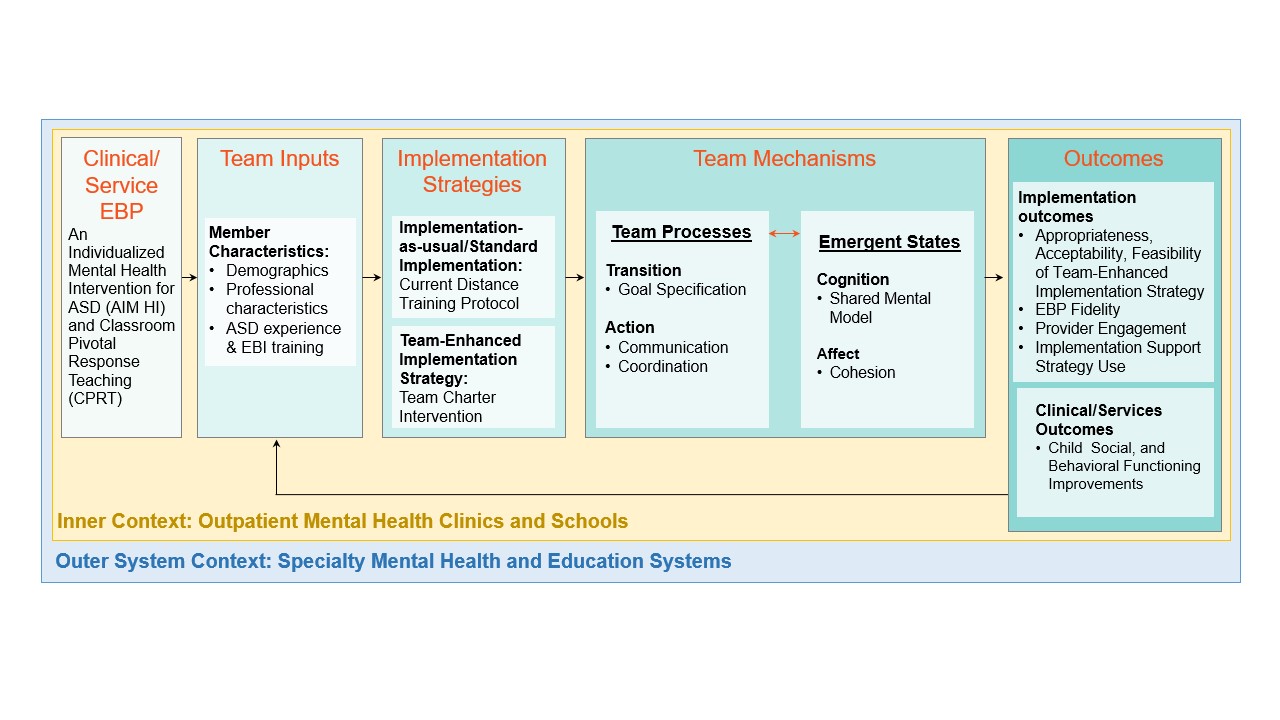R34 #2 - Applying Team Charters to Improve Distance Training Outcomes for Autism Interventions in Public Mental Health Services and Schools
Principal Investigator(s): Lauren Brookman-Frazee, Ph.D. (UC San Diego), Aubyn Stahmer, Ph.D. (UC Davis)
Project Summary
The purpose of this R34 is to develop and test a team charter-enhanced implementation strategy for distance training to increase the reach and effectiveness of two evidence-based intervention practices (EBPs) for autism across two public service systems. Our research groups have adapted, tested, and implemented autism EBPs across two service systems: Autism”) in publicly funded mental health services and in public school classrooms. Training providers (i.e., therapists, teachers) in these settings to deliver these EBPs improves child outcomes. A statewide hybrid implementation-effectiveness trial testing the effectiveness of pairing these EBP with an Autism EBP Implementation Strategy to improve the quality of care is currently underway. Although the implementation strategy is effective at increasing program/school-district use of EBP implementation supports and provider EBP fidelity, access is limited to programs near training facilities. Further, the implementation strategy appears to be less effective when EBP training is provided from a distance, resulting in fewer providers completing training. Thus, geographic distance is a barrier for children and families needing care, and for high-quality provider training. Although there are many advantages to distance training, and this will be increasingly required with the sustained impact of COVID-19, preliminary data from our current trials reveal several challenges with providing high-quality EBP training and ongoing consultation/coaching remotely. Distance training requires effective and efficient coordination between individuals with different roles and backgrounds. Thus, we propose to co-create and pilot test a team charter-enhanced implementation strategy using “team charters” to increase the reach of Autism EBPs through distance training.
Team Development Interventions Used in Project
Team Charters -Team Charters are a written document developed collaboratively by the team at the outset of their work together outlining expectations, goals, roles and responsibilities, and relevant policies and procedures for team collaborative operations. Research shows that Team Charters strengthen affective emergent states, such as trust and cohesion among team members, as well as cognitive emergent states, such as shared mental models. They also strengthen team processes, such as goal specification, communication, and coordination to optimize team effectiveness.
Specific Aims
- Partner with community stakeholders to co-create the Implementation Team Charter Enhanced Autism EBP Implementation Strategy for Distance Training (Autism TRAINER) to improve distance training outcomes. We will integrate Implementation Team Charters with the current Autism Implementation Strategy to target shared cognition and cohesion in distance training sites to improve team coordination.
- Conduct a “scale-out” open pilot trial to examine the impact of Autism TRAINER on provider EBP fidelity and training engagement, implementation support strategies (implementation outcomes), and changes in child outcomes (clinical effectiveness outcomes). We hypothesize that the enhanced model will be associated with improved implementation and child outcomes compared to the current implementation trials’ benchmarks established during post-COVID distance training.
- Assess mechanisms (shared cognition; team cohesion; team mechanisms) of the Autism TRAINER using qualitative methods and a novel application of natural language processing methods.
Conceptual Model

Funding Information: P50MH126231
Reference(s):
Effectiveness of a multi-level implementation strategy for ASD interventions: study protocol for two linked cluster randomized trials - PubMed (nih.gov)

